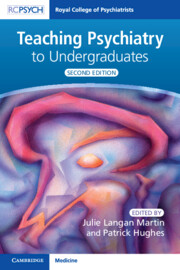Book contents
- Teaching Psychiatry to Undergraduates
- Teaching Psychiatry to Undergraduates
- Copyright page
- Contents
- Contributors
- Section 1 Principles of Medical Education
- Section 2 The Undergraduate Psychiatry Curriculum: Planning and Delivery
- Section 3 Clinical Placements in Psychiatry
- Section 4 Formal Teaching
- Section 5 Materials Development
- Section 6 Gathering feedback and quality improvement
- Section 7 Student Welfare
- Chapter 7.1 The Student in Difficulty
- Chapter 7.2 What Do I Do?
- Chapter 7.3 Raising Awareness and Promoting Well-Being
- Section 8 Developing as a medical educator
- Index
- References
Chapter 7.1 - The Student in Difficulty
from Section 7 - Student Welfare
Published online by Cambridge University Press: 12 October 2022
- Teaching Psychiatry to Undergraduates
- Teaching Psychiatry to Undergraduates
- Copyright page
- Contents
- Contributors
- Section 1 Principles of Medical Education
- Section 2 The Undergraduate Psychiatry Curriculum: Planning and Delivery
- Section 3 Clinical Placements in Psychiatry
- Section 4 Formal Teaching
- Section 5 Materials Development
- Section 6 Gathering feedback and quality improvement
- Section 7 Student Welfare
- Chapter 7.1 The Student in Difficulty
- Chapter 7.2 What Do I Do?
- Chapter 7.3 Raising Awareness and Promoting Well-Being
- Section 8 Developing as a medical educator
- Index
- References
Summary
This chapter explores some of the problems and challenges that can arise for students during undergraduate medical training. Potential reasons for the difficulties that students experience are explored and ways to recognise students who may be in difficulty are highlighted. Challenges in recognising students who are in difficulty are highlighted and potential barriers to students seeking help are considered.
- Type
- Chapter
- Information
- Teaching Psychiatry to Undergraduates , pp. 173 - 176Publisher: Cambridge University PressPrint publication year: 2022



